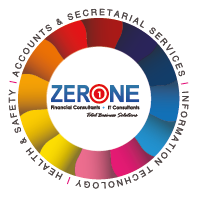What Zero One Consultants can do for you
- Set up your limited company for your business.
- Register your limited company for Corporation Tax Services (CT) with HM Revenue & Customs (HMRC).
- Guide you through the year, accounting period, how to keep your accounting records and supporting documents for Corporation Tax Services (CT) purpose.
- How and what statutory books your business needs to maintain.
- Prepare your statutory accounts and ready them for your submission to HM Revenue & Customs (HMRC).
- Calculate your corporation tax liability and guide you how to pay before your due time without attracting any penalties.
- Guide you to make an early assessment and then to budget your Corporation Tax Liability.
Click below or ring us to book an initial meeting for your needs:
- ➤Zero One Consultants Contact Us.
- ➤Zero One Consultants 9:00-18:30, 07800 568080, 07847 666003
- ➤Zero One Consultants 9:00-18:30, 0161 8501970
- ➤Zero One Consultants Visit in office
or
Now if you like to read in detail what Corporation Tax Services (CT) is about you may read the details below.
Corporation Tax
For your Limited Liability Business
1. Corporation Tax
You must pay Corporation Tax on profits from doing business as:
- A limited company.
- Any foreign company with a United Kingdom branch or office.
- A club.
- Other unincorporated association, e.g. a community group or sports club.
If you have registered your business as a limited liability company, limited by shares or by guarantee, then you are not subject to income tax but the corporation tax, which is levied on your taxable profit derived from your limited company business.
You do not get a bill for Corporation Tax. There are specific things you must do to work out, report and pay your corporation tax.
- 1. Register for Corporation Tax when you start doing business, this must be after the limited company is formed for you if Zero One Consultants have not formed this company for you.
- ➤You may contact Zero One Consultants as soon as possible.
- 2. Restart a dormant business, if you set up your company and have told HM Revenue & Customs (HMRC) that you will not be doing any business but will be keeping the company for
-
- Saving the name
- Intentions to trade in future
- Just starting trade after submitting your previous year dormant
- ➤You may contact Zero One Consultants as soon as possible.
- 3. Unincorporated Association, Zero One Consultants, must write to HM Revenue & Customs (HMRC) for your tax affairs so get in contact with Zero One Consultants as soon as possible. An ‘unincorporated association’ is an organisation set up through an agreement between a group of people who come together for a reason other than to make a profit (for example, a voluntary group or a sports club). You don’t need to register an unincorporated association, and it doesn’t cost anything to set one up. Individual members are personally responsible for any debts and contractual obligations. If you make a profit , If the association does start trading and makes a profit, you’ll need to pay Corporation Tax and file a Company Tax Return in the same way as a limited company.
2. Company and Accounting Records
You must keep:
- Records about the company itself
- Financial and accounting records
HM Revenue & Customs (HMRC) recommends you, in all their guidelines to hire a professional to deal with your tax affairs, guide you to maintain your statutory records and to file your yearend accounts and tax returns.
a) Records About the Company
You must keep details of:
- Directors, shareholders and company secretaries
- The results of any shareholder votes and resolutions
- Promises for the company to repay loans at a specific date in the future (‘debentures’) and who they must be paid back to
- Promises the company makes payments if something goes wrong and it’s the company’s fault (‘indemnities’)
- Transactions when someone buys shares in the company
- Loans or mortgages secured against the company’s assets
- Register of "people with significant control".
-
- Has more than 25% shares or voting rights in your company
- Can appoint or remove a majority of directors
- Can influence or control your company or trust
-
- ☞ You must keep a register of People with Significant Control (PSC). Your People with Significant Control (PSC) register must include details of people described in clause g (i - iii). This is a statutory register which must be kept showing if, either your company have People with Significant Control (PSC) Or not.
- ☞ You must tell Companies House (CH) if you keep the records somewhere other than the company’s registered office address.
Zero One Consultants strongly recommends if you are not fully aware of Companies House (CH) and HM Revenue & Customs (HMRC) compliance work then consider Zero One Consultant’s Trusted Management Services (TMS) to comply with the compliance work.
b) Accounting Records
You must keep accounting records that include:
- All money received and spent by the company
- Details of assets owned by the company
- Debts the company owes or is owed
- Stock, the company, owns at the end of the financial year
- The stocktaking’s you used to work out the stock figure
- All goods bought and sold
- Who you bought and sold them to and from (unless you run a retail business)
You must also keep any other financial records, information and calculations you need to prepare and file your annual accounts and Company Tax Return.
This includes records of:- All money spent by the company, for example, receipts, petty cashbooks, orders and delivery notes.
- All money received by the company, for example, invoices, contracts, sales books and till rolls.
- Any other relevant documents, for example, bank statements and correspondence.
HM Revenue & Customs (HMRC) can fine you £3,000, or you will be Disqualified as a Company Director if you don’t keep accounting records.
c) How long to keep records?
You must keep records for six years from the end of the last company financial year they relate to, or longer if:
- They show a transaction that covers more than one of the company’s accounting periods
- The company has bought something that it expects to last more than six years, like equipment or machinery
- You sent your company tax return late
- HM Revenue & Customs (HMRC) has started a compliance check on your company tax return
d) If your records are lost, stolen or destroyed
If you can not replace your records lost, stolen or destroyed you must do your best to recreate them. Tell your Corporation Tax office straight away and also include this information on your Company Tax Return.
3. Advantages of Limited Company
1. Tax
The main advantage of running your business as a limited company is that you are likely to pay less tax than a sole trader. Although you are not liable to pay income tax, you will be paying corporation tax due to the nature of the business structures. Corporation Tax Tables. As a sole trader, you pay certain income tax and national insurances, after certain tax-exempt earnings, and up to a certain level of income and then you pay a higher rate and then additional rate after certain levels of incomes as compared to the one flat rate of corporation tax. Corporation Tax Tables vs Income Tax Tables.
2. Distinct Entity
Limited company is a separate legal entity from its owners. Everything from the company bank account/s, to ownership of asset/s and involvement in tenders and contract/s, is purely company business and under its seal (name/stamp) and totally separate from the interests of the company’s shareholders. You can register your company and business name not only with Companies House (CH) but also with Intellectual Property Office (IPO) for added security and trademark purposes. Check our Intellectual Property Office (IPO) section for further guidance about how to register your trademark.
3. Limited Liability
Running your business as a limited company means you have the reassurance of ‘limited liability’ not just as a word but real limited liability. Assuming no fraud has taken place in your business activities, your ‘limited liability’ means you will not be personally liable for any financial losses made by your business. A limited company can, therefore, give you this added protection and security, should the things ever go wrong.
4. Professional
In some businesses and industries, having a limited company can provide a more professional image but not necessarily in fair and unbiased view. A limited liability structure does look better, professional, structured and organised but this is not the only selling point of view of Zero One Consultants, although Zero One Consultants does believe in enormous benefits of having a trade through limited liability company Zero One Consultants will not discriminate the self-employed people.
5. Funding
Finding funding can be difficult for all types of businesses in the current climate. But because a limited company is a distinct entity from its owners it may be a little easier for a company to secure business finance than it is for their sole trader counterparts.
6. Naming
Once you register your company with Companies House (CH) your company name is protected by law. No one else can use the same name as you, or anything deemed to be too similar or too close, but this can be very tricky sometimes. If you want an absolute control of your name, then you may register your business name or trade name with Intellectual Property Office for added security and trademark purposes. Also, check our Intellectual Property Office (IPO) section for further guidance.
7. Shareholders
Limited company can issue various classes of shares. This means you can easily sell stakes in the company, or transfer ownership of shares in the times you need. If your limited company has more than one shareholders, you should get a Shareholder’s Agreement. Zero One Consultants strongly recommends this especially if you are issuing shares to people outside your family to raise more funds.
8. Costs
Many people prefer to operate as sole traders rather than limited companies because the start-up and running costs are perceived to be significantly lower. However, Zero One Consultants can form a limited company with as little as £90.00, so the price of setting up a company is minimal. Zero One Consultants will charge more for preparing annual accounts for a limited company than they would for a sole trader, not always right or always wrong Terms and Conditions Apply (T&C). Zero One Consultants can quote you on what both options may cost you. But it has been seen in Zero-One Consultants’ professional experience, at a similar level business (mango compared with mango) limited companies are better off. Historically, the client’s would pay their accountants to handle all the administration involved with a limited company, depending on their Service Level Agreement (SLA) with Zero One Consultants this may not cost you as much as you may think it costs.
9. Pensions
Limited company can fund its employees’ executive pensions as a legitimate business expense. This can offer a tax advantage over those who are running their business as self-employed.
10. Succession
A shareholder wishes to retire, sell his shareholding, or dies, it is far easier to transfer ownership of a limited company than a non-registered business structure.

